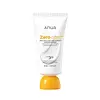What's inside
What's inside
 Key Ingredients
Key Ingredients

 Benefits
Benefits

 Concerns
Concerns

 Ingredients Side-by-side
Ingredients Side-by-side

Butyl Methoxydibenzoylmethane
UV AbsorberHomosalate
Skin ConditioningEthylhexyl Salicylate
UV AbsorberOctocrylene
UV AbsorberWater
Skin ConditioningButyloctyl Salicylate
Skin ConditioningGlycerin
HumectantDimethicone
EmollientPoly C10-30 Alkyl Acrylate
Emulsion StabilisingVp/Eicosene Copolymer
Cetearyl Alcohol
EmollientNiacinamide
SmoothingSodium Stearoyl Glutamate
CleansingAmmonium Polyacryloyldimethyl Taurate
Emulsion StabilisingHydroxyacetophenone
AntioxidantPhenoxyethanol
PreservativeTocopheryl Acetate
AntioxidantPanthenol
Skin ConditioningPentaerythrityl Tetra-Di-T-Butyl Hydroxyhydrocinnamate
AntioxidantXanthan Gum
Emulsifying1,2-Hexanediol
Skin ConditioningSodium Hyaluronate
HumectantButyl Methoxydibenzoylmethane, Homosalate, Ethylhexyl Salicylate, Octocrylene, Water, Butyloctyl Salicylate, Glycerin, Dimethicone, Poly C10-30 Alkyl Acrylate, Vp/Eicosene Copolymer, Cetearyl Alcohol, Niacinamide, Sodium Stearoyl Glutamate, Ammonium Polyacryloyldimethyl Taurate, Hydroxyacetophenone, Phenoxyethanol, Tocopheryl Acetate, Panthenol, Pentaerythrityl Tetra-Di-T-Butyl Hydroxyhydrocinnamate, Xanthan Gum, 1,2-Hexanediol, Sodium Hyaluronate
Water
Skin ConditioningButyloctyl Salicylate
Skin ConditioningDibutyl Adipate
EmollientEthylhexyl Triazone
UV AbsorberGlycerin
HumectantTerephthalylidene Dicamphor Sulfonic Acid
UV AbsorberBis-Ethylhexyloxyphenol Methoxyphenyl Triazine
Skin ConditioningPolyglyceryl-3 Distearate
EmulsifyingTromethamine
Buffering1,2-Hexanediol
Skin ConditioningPentylene Glycol
Skin ConditioningDiethylamino Hydroxybenzoyl Hexyl Benzoate
UV FilterCetearyl Alcohol
EmollientPolysilicone-15
UV FilterMethylpropanediol
SolventPotassium Cetyl Phosphate
EmulsifyingPolymethylsilsesquioxane
Caprylyl Methicone
Skin ConditioningGlyceryl Stearate
EmollientPoly C10-30 Alkyl Acrylate
Emulsion StabilisingSodium Acrylates Crosspolymer-2
AbsorbentInulin Lauryl Carbamate
Emulsion StabilisingCarbomer
Emulsion StabilisingBeta Vulgaris Extract
Skin ProtectingAcrylates/C10-30 Alkyl Acrylate Crosspolymer
Emulsion StabilisingGlyceryl Stearate Citrate
EmollientEthylhexylglycerin
Skin ConditioningCynara Scolymus Leaf Extract
Skin ConditioningAvena Sativa Kernel Extract
AbrasivePolyquaternium-51
Skin ConditioningCamellia Sinensis Leaf Water
MaskingPolyether-1
Beta-Glucan
Skin ConditioningHydrogenated Lecithin
EmulsifyingPropanediol
SolventBiosaccharide Gum-1
HumectantTocopherol
AntioxidantButylene Glycol
HumectantDimethylsilanol Hyaluronate
HumectantHydrolyzed Hyaluronic Acid
HumectantHydrolyzed Sodium Hyaluronate
Skin ConditioningPotassium Hyaluronate
Skin ConditioningHyaluronic Acid
HumectantSodium Hyaluronate
HumectantSodium Hyaluronate Crosspolymer
HumectantHydroxypropyltrimonium Hyaluronate
Sodium Hyaluronate Dimethylsilanol
HumectantSodium Acetylated Hyaluronate
HumectantWater, Butyloctyl Salicylate, Dibutyl Adipate, Ethylhexyl Triazone, Glycerin, Terephthalylidene Dicamphor Sulfonic Acid, Bis-Ethylhexyloxyphenol Methoxyphenyl Triazine, Polyglyceryl-3 Distearate, Tromethamine, 1,2-Hexanediol, Pentylene Glycol, Diethylamino Hydroxybenzoyl Hexyl Benzoate, Cetearyl Alcohol, Polysilicone-15, Methylpropanediol, Potassium Cetyl Phosphate, Polymethylsilsesquioxane, Caprylyl Methicone, Glyceryl Stearate, Poly C10-30 Alkyl Acrylate, Sodium Acrylates Crosspolymer-2, Inulin Lauryl Carbamate, Carbomer, Beta Vulgaris Extract, Acrylates/C10-30 Alkyl Acrylate Crosspolymer, Glyceryl Stearate Citrate, Ethylhexylglycerin, Cynara Scolymus Leaf Extract, Avena Sativa Kernel Extract, Polyquaternium-51, Camellia Sinensis Leaf Water, Polyether-1, Beta-Glucan, Hydrogenated Lecithin, Propanediol, Biosaccharide Gum-1, Tocopherol, Butylene Glycol, Dimethylsilanol Hyaluronate, Hydrolyzed Hyaluronic Acid, Hydrolyzed Sodium Hyaluronate, Potassium Hyaluronate, Hyaluronic Acid, Sodium Hyaluronate, Sodium Hyaluronate Crosspolymer, Hydroxypropyltrimonium Hyaluronate, Sodium Hyaluronate Dimethylsilanol, Sodium Acetylated Hyaluronate
 Reviews
Reviews

Ingredients Explained
These ingredients are found in both products.
Ingredients higher up in an ingredient list are typically present in a larger amount.
1,2-Hexanediol is a synthetic liquid and another multi-functional powerhouse.
It is a:
- Humectant, drawing moisture into the skin
- Emollient, helping to soften skin
- Solvent, dispersing and stabilizing formulas
- Preservative booster, enhancing the antimicrobial activity of other preservatives
Butyloctyl Salicylate is a chemical UV filter structurally similar to octisalate. It is a photostabilizer, SPF booster, emollient and solvent. This ingredient helps evenly spread out ingredients.
According to a manufacturer, it is suitable for pairing with micro Titanium Dioxide, Zinc Oxide, and pigments.
Photostabilizers help stabilize UV-filters and prevents them from degrading quickly.
Learn more about Butyloctyl SalicylateCetearyl alcohol is a mixture of two fatty alcohols: cetyl alcohol and stearyl alcohol. It is mainly used as an emulsifier. Emulsifiers help prevent the separation of oils and products. Due to its composition, it can also be used to thicken a product or help create foam.
Cetearyl alcohol is an emollient. Emollients help soothe and hydrate the skin by trapping moisture.
Studies show Cetearyl alcohol is non-toxic and non-irritating. The FDA allows products labeled "alcohol-free" to have fatty alcohols.
This ingredient is usually derived from plant oils such as palm, vegetable, or coconut oils. There is debate on whether this ingredient will cause acne.
Due to the fatty acid base, this ingredient may not be Malassezia folliculitis safe.
Learn more about Cetearyl AlcoholGlycerin is already naturally found in your skin. It helps moisturize and protect your skin.
A study from 2016 found glycerin to be more effective as a humectant than AHAs and hyaluronic acid.
As a humectant, it helps the skin stay hydrated by pulling moisture to your skin. The low molecular weight of glycerin allows it to pull moisture into the deeper layers of your skin.
Hydrated skin improves your skin barrier; Your skin barrier helps protect against irritants and bacteria.
Glycerin has also been found to have antimicrobial and antiviral properties. Due to these properties, glycerin is often used in wound and burn treatments.
In cosmetics, glycerin is usually derived from plants such as soybean or palm. However, it can also be sourced from animals, such as tallow or animal fat.
This ingredient is organic, colorless, odorless, and non-toxic.
Glycerin is the name for this ingredient in American English. British English uses Glycerol/Glycerine.
Learn more about GlycerinThis ingredient is a polymer made from acrylic acid esters and long-chain (C10–C30) alcohols.
It is used as an emulsion stabilizer and viscosity controlling agent. This helps products maintain a smooth and uniform texture.
Sodium Hyaluronate is hyaluronic acid's salt form. It is commonly derived from the sodium salt of hyaluronic acid.
Like hyaluronic acid, it is great at holding water and acts as a humectant. This makes it a great skin hydrating ingredient.
Sodium Hyaluronate is naturally occurring in our bodies and is mostly found in eye fluid and joints.
These are some other common types of Hyaluronic Acid:
Learn more about Sodium HyaluronateWater. It's the most common cosmetic ingredient of all. You'll usually see it at the top of ingredient lists, meaning that it makes up the largest part of the product.
So why is it so popular? Water most often acts as a solvent - this means that it helps dissolve other ingredients into the formulation.
You'll also recognize water as that liquid we all need to stay alive. If you see this, drink a glass of water. Stay hydrated!
Learn more about Water